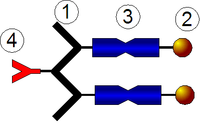
Photo from wikipedia
Although it is reported that the targeting ability of hyaluronic acid (HA)-based nanoparticles (NPs) is molecular weight (MW) dependent, the influence of HA MW on targeting efficiency of HA-functionalized NPs… Click to show full abstract
Although it is reported that the targeting ability of hyaluronic acid (HA)-based nanoparticles (NPs) is molecular weight (MW) dependent, the influence of HA MW on targeting efficiency of HA-functionalized NPs and the underlying mechanism remain elusive. In this study, we constituted three HA-functionalized Dox-loaded NPs (Dox/HCVs) different HA MWs (7, 63, and 102 kDa) and attempted to illustrate the effects of HA MW on the targeting efficiency. The three Dox/HCVs had similar physiochemical and pharmaceutical characteristics, but showed different affinity to CD44 receptor. Furthermore, Dox/HCV-63 exerted the best targeting effect and the highest cytotoxicity compared with Dox/HCV-7 and Dox/HCV-102. It was interesting to found that both the HA-CD44 binding affinity and induced CD44 clustering by HA-based NPs were HA MW-dependent, the two of which determine the apparent targeting efficacy of Dox/HCV NPs in the conflicting directions. Those results laid a good foundation for rationally designing HA-based NPs in cancer therapy.
Journal Title: Asian Journal of Pharmaceutical Sciences
Year Published: 2019
Link to full text (if available)
Share on Social Media: Sign Up to like & get
recommendations!